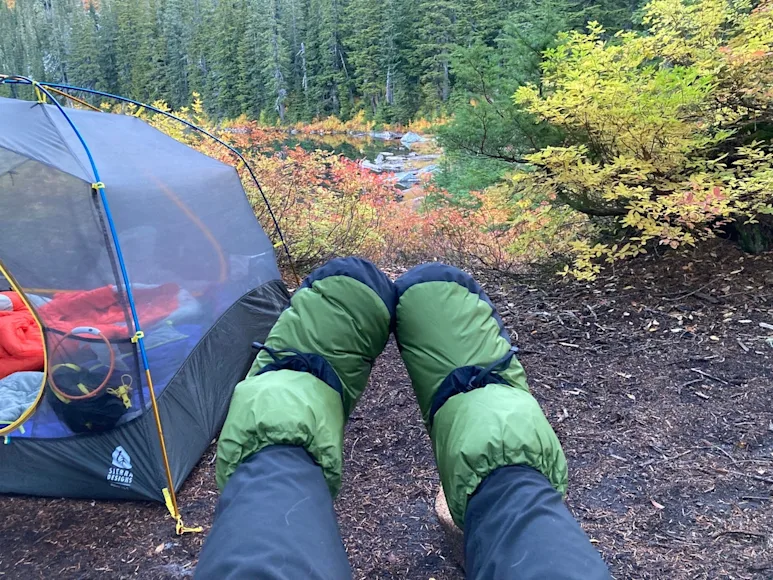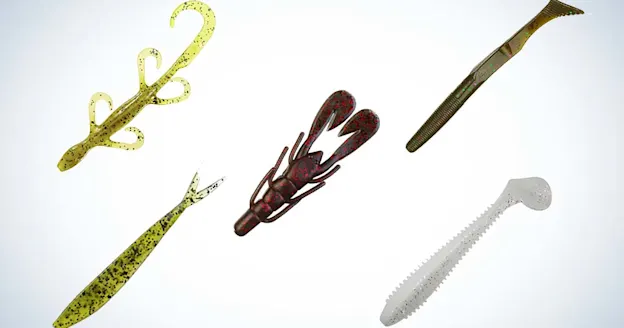_We may earn revenue from the products available on this page and participate in affiliate programs. Learn more ›
_
Best Overall
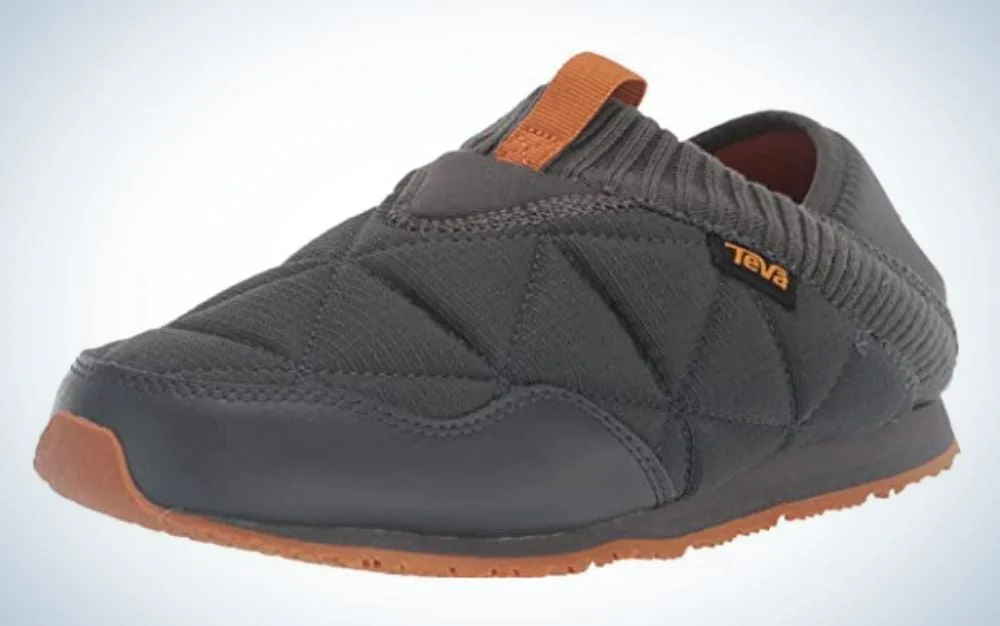
Teva ReEmber Camp Slipper
LEARN MORE
Summary
Teva ReEmber Camp Slippers are comfortable and water-resistant shoes suitable for all-day wear, running errands in town, or hanging out at camp.
Best Backpacking
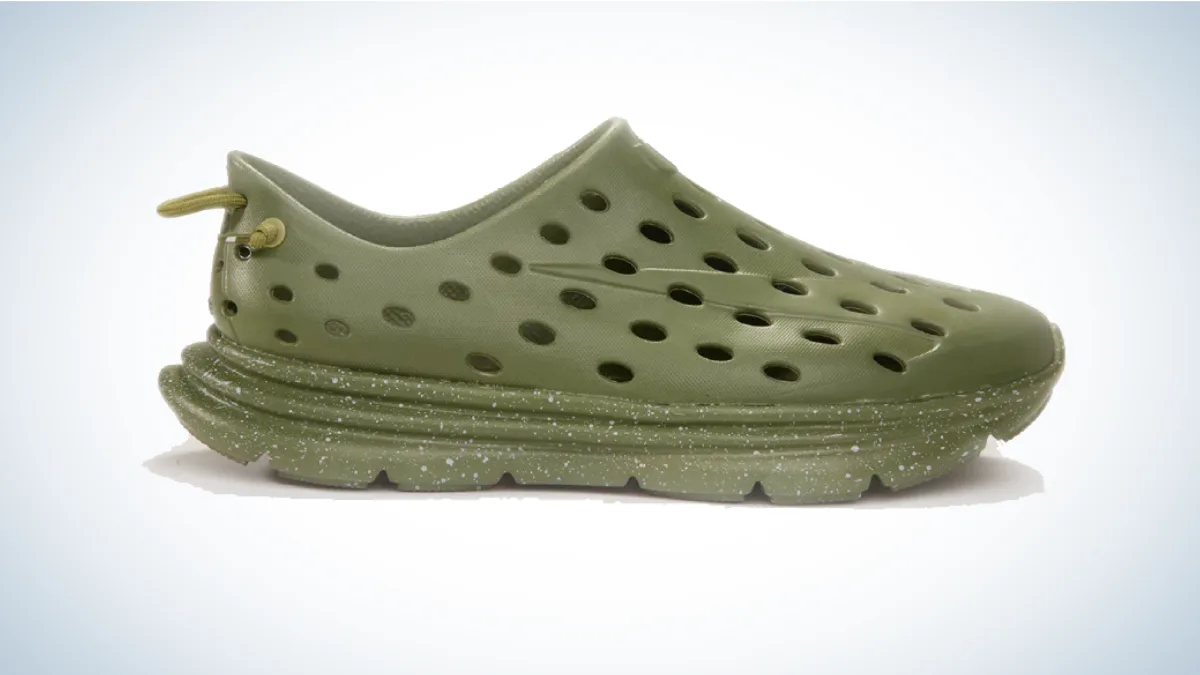
Kane Revive
LEARN MORE
Summary
The Kane Revive is a lightweight active recovery shoe that lets your feet relax and recover after a long day of backpacking.
Best Lightweight
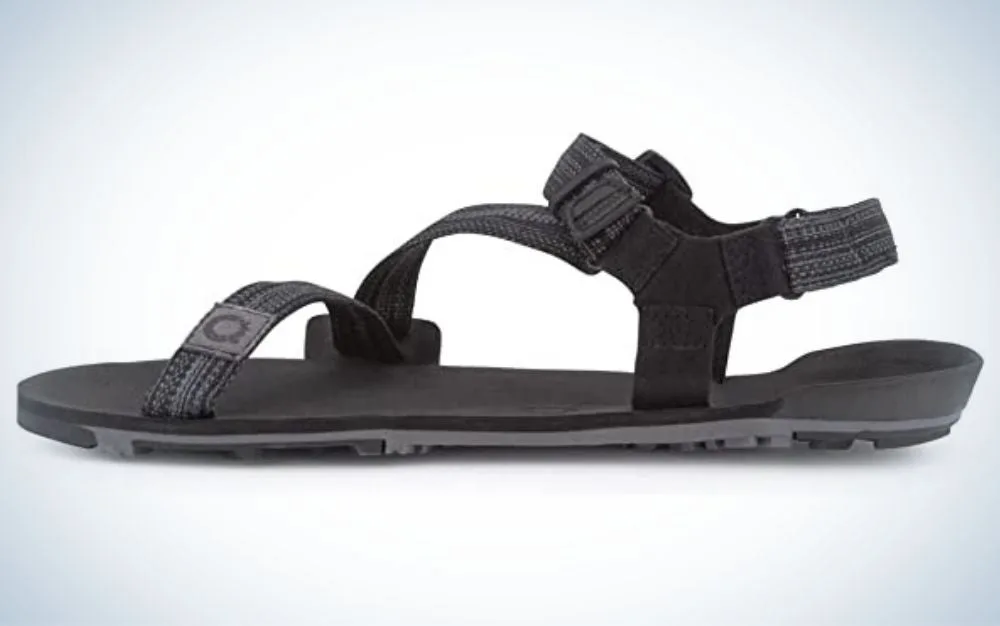
Xero Shoes Z Trail EV
LEARN MORE
Summary
These trail sandals boast a minimalist design using only the materials necessary for on trail and in camp protection.
Camp shoes can be an underrated outdoor classic. Whether you are backpacking, car camping, overlanding, or hunting, a comfortable pair helps you unwind after a day of adventure. You can wear the same shoes for your entire trip, but that won’t give your feet much of a break or give your (stinky) boots any breathing time. While we all have our style and comfort preferences, in our opinion, the best camp shoes provide comfort, protection, and are easy to slip on and off.
Best Overall: Teva ReEmber Camp Slipper
Best Backpacking: Kane Revive
Best Lightweight: Xero Shoes Z Trail EV
Most Versatile: Crocs Classic Clogs
Best for Cold Weather: Feathered Friends Down Booties
Best Budget: Crocs Baya Flip Flops
How We Picked the Best Camp Shoes
To narrow down the best of the best camp shoes, we evaluated the many options using our buying considerations and a few other factors, including:
Longevity: How long are the shoes expected to last? Is there a repair policy in place? What is the company warranty? Are they made from durable materials?
Versatility: Do these shoes work well as more than just camp shoes? Can I wear these at camp even when it is raining? Are these good for all environments? Can I wear them with socks if my feet get cold?
Practicality: Even though camp shoes should be comfortable, they should still be practical for outdoor spaces. Some traction on the sole, a secure fit, and general comfort for the temperatures all need to be considered.
Customer Service: Does the company respond when you inquire about products or company policies? Are they transparent about product production and sustainability claims? Are they willing to listen to customer feedback and correct mistakes when they happen?
Personal experience with certain products, verified customer testimonials, and company-specific research was also considered.
Best Camp Shoes: Reviews and Recommendations
Best Overall: Teva ReEmber Camp Slipper
Best Overall

Specs
Weight Per Pair: N/A
Materials: 100% recycled ripstop polyester, 50% recycled EVA foam and rubber
Best Use: casual wear
Pros
Made from primarily recycled materials
Water-resistant uppers
Easy to slip on and off
Available in a variety of colors
Cons
Not breathable
Sizes can run small
The Teva ReEmber Camp Slippers are an all-around comfy camp shoe. They are stylish enough that you can wear them around town and protective enough to wear when you camp. The water-resistant upper of the shoe provides ample protection from morning dew and light rain. Although it is a plush comfortable material, it is also quite durable as it is made from ripstop materials.
Made from primarily recycled materials, these shoes provide slipper-level comfort with the feel of a trainer. They are relatively secure, but since they are slip-on shoes, do not expect them to be as secure as your hiking boots.
Although our variety is a lower cut, they also have a ReEmber Mid that covers your full ankle. If you are camping in the shoulder seasons, the higher design is preferable as it provides better coverage and warmth. Some campers may struggle with the lack of breathability. On cold nights and mornings, though, they are cozy with or without socks.
Best Backpacking: Kane Revive
Best Backpacking

Specs
Weight Per Pair: 8.9 ounces
Materials: Sugarcane-based EVA foam
Best Use: Active recovery shoe
Pros
True to size
Comfortable
Lightweight
Durable
Washable and quick drying
Cons
Not the most breathable
A bit bulky for travel
After a long day on the trail, your feet are worn out. You may have blisters and hot spots or sore arches that need some relief before the next day of hiking. While I was skeptical of the Kane Revive due to their size, their lightweight and active recovery features won me over after using them all hiking season. When bringing them backpacking, I’ve found it most accessible to store them in the front mesh pocket of my backpack
to swap my shoes ASAP when I get to camp. They also have hang loops on the back of the shoes if your pack has no room.
I’ve found the Kane Revive to be one of the most comfortable camp shoes I’ve tried so far. I always have them in my car post day hiking and enjoy them while running errands around town. Their comfort makes up for the bulky build. Made from EVA foam with holes on the top, they’re relatively breathable. It is still worth noting that on warmer summer days, my feet did sweat some, so I’ve found wearing socks with these shoes is ideal.
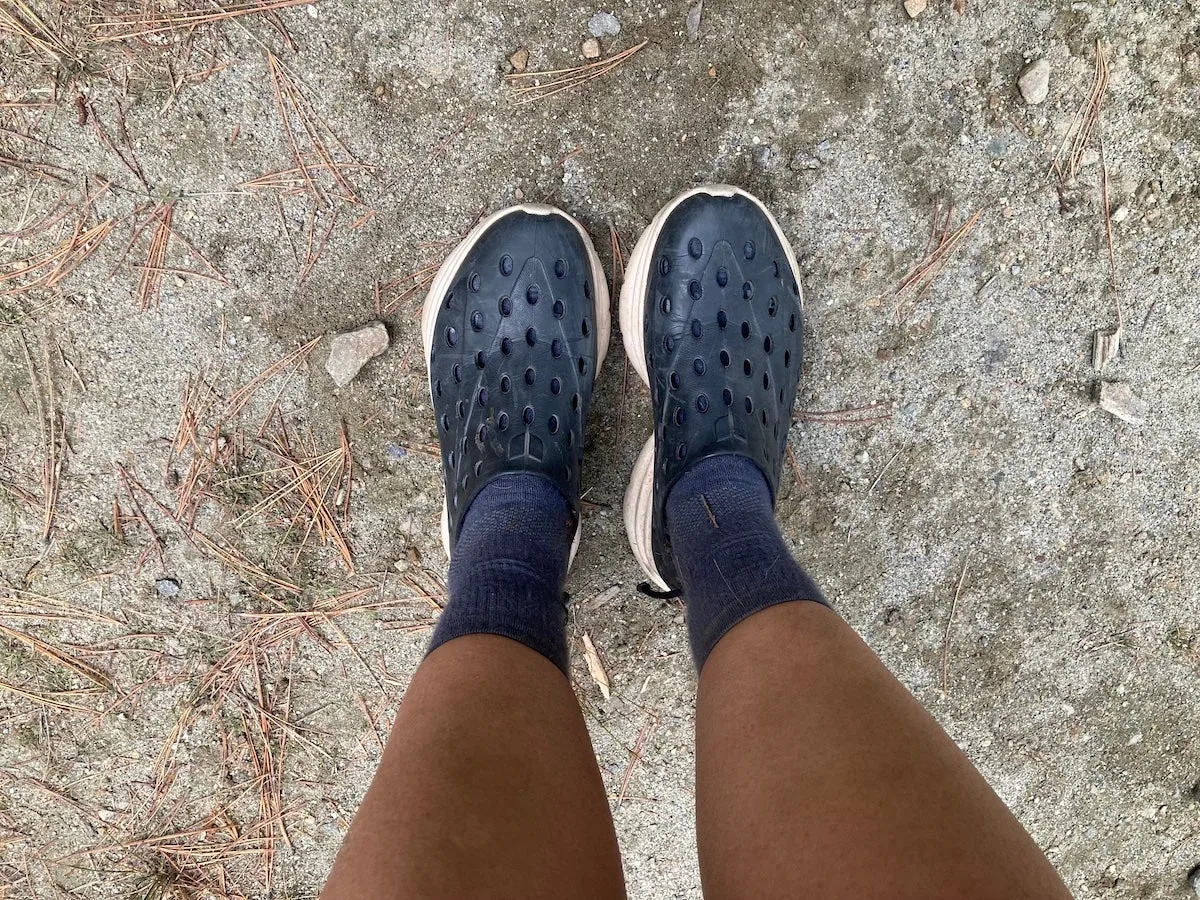
I can wear these Kane active recovery shoes for hours without aches or pains. Meg Carney
Another big sell with these shoes is that they can double as a water crossing or water shoe, depending on the type of backpacking trip. The thick soles protect my feet when walking in the water, and the holes on the top of the shoe make it easy to drain the water out and move down the trail. Overall, if you can get past the size, these lightweight recovery shoes could easily become your favorite camp shoes in no time.
Best Lightweight: Xero Shoes Z Trail EV
Best Lightweight

Specs
Weight Per Pair: 10.8 ounces
Materials: Foam, rubber, and nylon
Best Use: Walking, day hiking, daily wear
Pros
5,000 mile warranty
Small and packable
Excellent traction
Durable and long lasting
Cons
Not very supportive (also a pro)
Not secure when wet
Xero Shoes Z-Trail EV sandals are a go-to backpacking camp shoe and an all-around daily shoe in the summer. Barefoot shoes can take some getting used to, but they help your feet build strength as you walk. The shoes are not very supportive to some, but that’s kind of the point. It lets your body take over more natural movement, helping you recover after a day on the trail.
The thin soles and lightweight construction ensure that no unnecessary materials go into making these shoes. And even though they are thin shoes, the durability is unmatched with a 5,000-mile warranty. These work best for warm weather conditions, but with a Z-strap design, you can also wear them in the shoulder seasons with a pair of socks. Since they are hiking sandals, they have enough traction to help you scramble on river banks to fill up water or even perform a river crossing while hiking.
The transition can take a while if you’ve never worn barefoot shoes like these. As camp shoes, you aren’t walking around too much, but you also don’t want your feet to be sorer for the next day of hiking. As someone who wears Xero shoes daily, my feet have built up the strength needed to feel comfortable even after a day of hiking in a pair. If you invest in a pair, prepare your feet for the journey by walking around barefoot at home and wearing sandals while you run errands. That way, when it comes time to use them in camp, your feet are happy, not sore from overworked muscles.
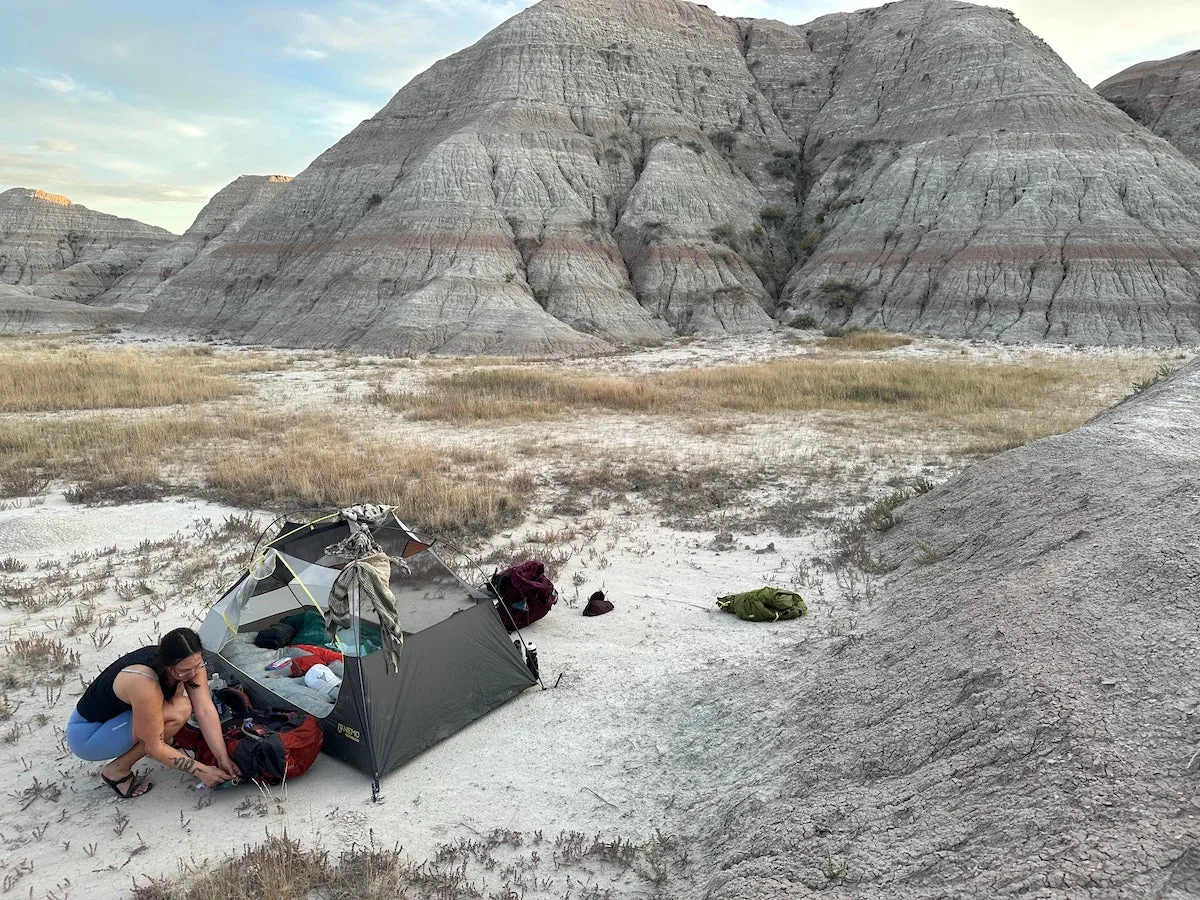
I love these Xero camp shoes for warmer weather camping. Meg Carney
After using these shoes for countless backpacking trips, day hikes, and river trips—along with wearing them daily in the summer for over two years—they are still going strong. While the soles and straps have held up well, the back velcro has begun to wear out and is less secure than it used to be. It would be nice if there were an additional or alternative attachment for the heel strap to avoid the velcro being the first part of the shoe to wear out.
Most Versatile: Crocs Classic Clogs
Most Versatile
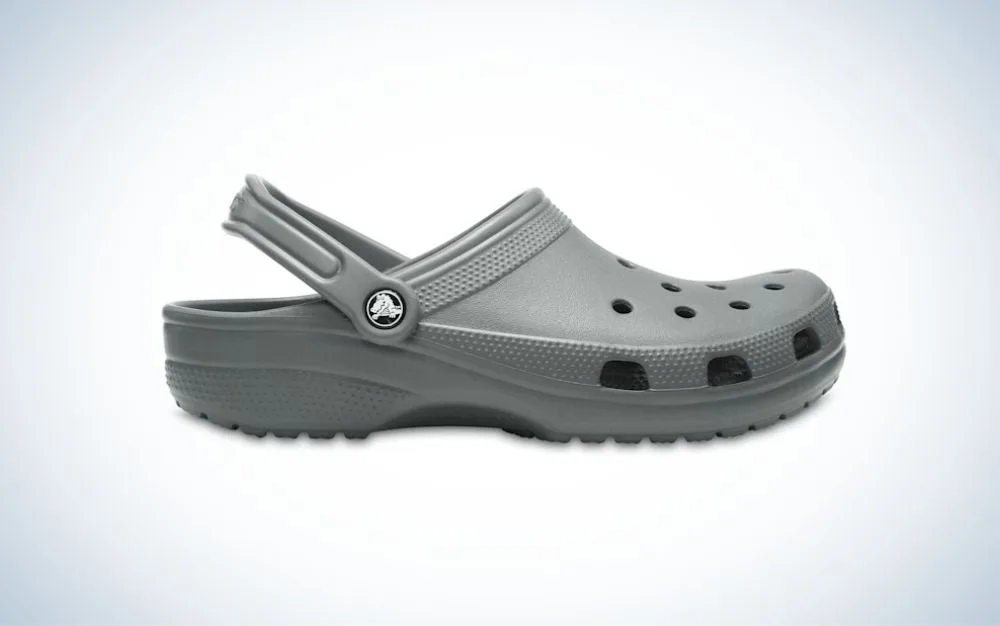
Specs
Weight Per Pair: 12 ounces
Materials: CrosliteTM and Ethylene Vinyl Acetate
Best Use: Casual wear
Pros
Affordable price
Available in several design options
Comfortable
Quick drying materials
Cons
Not the best for desert environments
Crocs Classic Clogs are a timeless shoe option for gardening, running errands, and camping. They are very versatile shoes for daily wear but also outdoor experiences. Since they are made from synthetic materials, they can go into the water and dry quickly.
Available in various colors and designs, they are very easy to personalize. While they may not be suitable for hiking, they provide adequate traction and security for casual chores and walking around camp. If you are in a campground, you can wear these as shower shoes. Since Crocs Clogs tend to be roomier than some of their other shoe options, they are also perfect for shoulder season camping. In the summer, you can wear these with no socks, and as the weather cools off, add a pair of wool socks, and your feet are comfortable and cozy.
Best for Cold Weather: Feathered Friends Down Booties
Best for Cold Weather
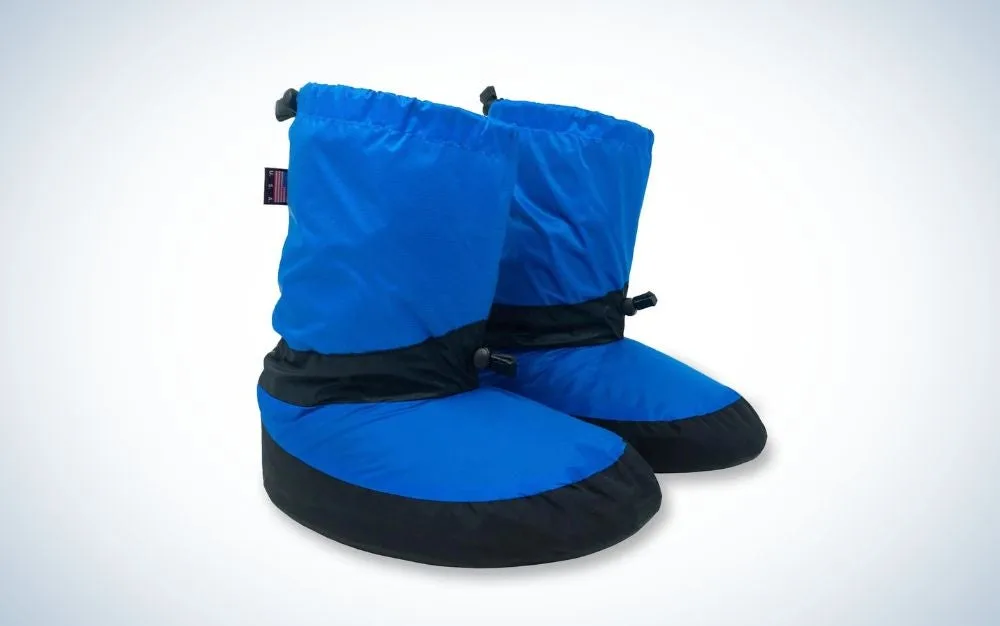
Specs
Weight Per Pair: 9.3 ounces
Materials: Pertex Endurance shell fabric, 800-fill power down
Best Use: Alpine basecamp shoes
Pros
Warm and cozy
Waterproof
Easy to slip on
Relatively secure fit
Cons
Built for warmth, not walking long distances
The Feathered Friends Down Booties are the ideal winter camping companion. With 800-fill power European goose removable down insulated liners and a waterproof shell, these booties are built to keep your feet dry and warm. They’re quick and easy to slip on and off to get in and out of the tent, and I love that they not only pack down small, but you can essentially just stuff them anywhere in your pack, and they’ll fit.
While they will not fail at doing their job, they aren’t the best for walking around camp or doing a ton of camp chores. They have no traction on the sole, making it easy to slip around. But while I was lounging in the tent, cooking around the fire, or stepping out to go to the bathroom, these gave my feet a break from my hiking boots
. The drawstring around the ankles kept them securely on my feet, and I like that it gives me an option for a looser fit if I wanted to wear socks with them.
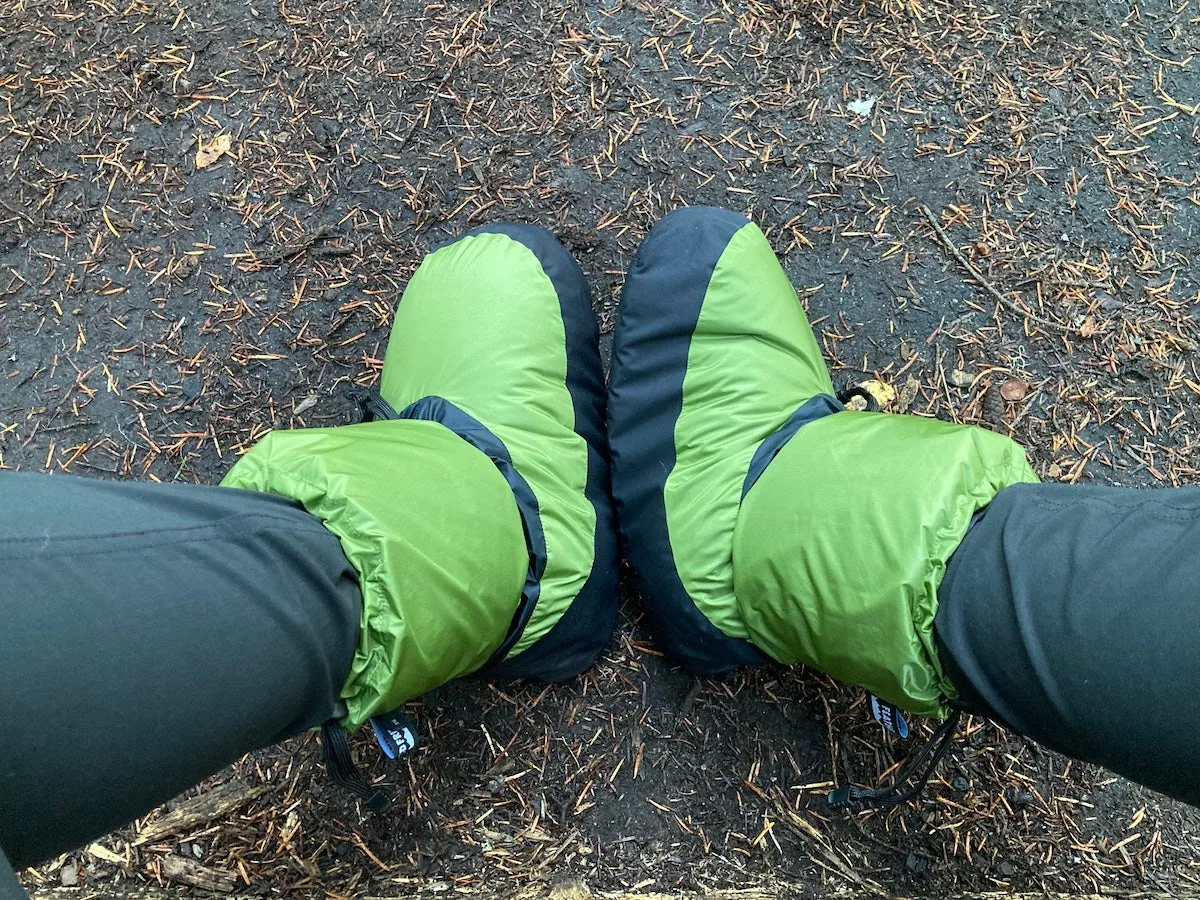
My feet stayed nice and warm snuggled inside these Feathered Friends booties. Meg Carney
The durability of the booties depends on how you use them. Utilize them as intended, and they can be a winter camping go-to for years. If you wear them to walk around more than intended, the sole will wear down much faster. As they state on their website, “They are built for warmth, not a marathon.”
Best Budget: Crocs Baya Flip Flops
Best Budget

Specs
Weight Per Pair: 7 ounces
Materials: Ethylene Vinyl Acetate and Croslite
Best Use: Casual warm weather wear
Pros
Lightweight
Easy to clean
Great value
Comfortable
Cons
Not the best for colder weather
If budget is the name of the game for you when buying camp shoes, we recommend any flip-flop or slip-on sandal. These function exceptionally well as camp shoes since they can also be worn around water or as shower shoes. We chose the Crocs Baya Flip Flops as our top budget pick because they provide excellent value for the price.
They are comfortable and can be worn around water, but they are also durable and easy to keep clean. Nubs on the footbed provide a massage-like feel, enhancing the wearer’s comfort. Even if the Baya Flip is not the style for you, Crocs offers a wide array of flip-flop designs for a similar price.
What to Consider When Choosing Camp Shoes
To avoid impulse buying and ensure you find a product that you love, it helps to consider a few things first. When it comes to camp shoes, we use the following categories to help us narrow down the options that work best for our needs.
Intended Use
Getting the right shoes for any activity often depends on how you plan to use them and where you plan to wear them. That’s why the best boat shoes
aren’t the best hiking shoes, and the best hiking shoes often are not the best camp shoes.
Having a pretty good understanding of the environment in which you plan to wear the camp shoes is very important. Then, knowing your comfort level in certain situations can help guide your decision. For instance, if you are someone whose feet get cold easily, having sandals as camp shoes might not be the best fit.
Although these are camp shoes, knowing how much you intend to walk in them is necessary. Some camp shoes are more like slippers than actual shoes, making them less durable and harder to walk. If you want a pair of shoes that give you a break from your hiking boots while still giving you the comfort and stability you need to do camp chores like fetching water or firewood, slipper-style shoes may not be the best fit.
Packability
Your intended use will largely influence how packable the shoes need to be. If you are car camping or RVing, the weight and overall size of the camp shoes may not matter all that much. If you are backpacking or bikepacking, a compact and lightweight pair of shoes is a must.
Sandals tend to be the most packable option but other lightweight slip-on shoes can easily be stored in the front mesh pocket of a backpack. Other shoes may have a strap on the back so you can clip them to your pack. Packing shoes inside of your pack is always an option but as someone who likes to change out of their hiking boots the moment I step into a campsite, they need to be as accessible as possible.
Protection and Versatility
Directly tied back to intended use, the protection and versatility needed in camp shoes vary from person to person. When camping in the warm summer months, the best hiking sandals
can also be the best camp shoes. As temperatures cool down or you’re in an area with more insects, having a camp shoe with more coverage is nice.
The shoe’s versatility is essential if you like to wear camp shoes to do more than just lounge in camp. Having a shoe that can double as footwear in a river crossing and a camp shoe is a plus, but if you are not backpacking, this won’t be much of a worry. However, if you are in a campground, having a shoe you can wear in the camp showers can help protect you from things like athlete’s foot. Consider different environments, too. Can you wear your camp shoes in the desert and the alpine? While there may not always be enough crossover for one pair of shoes to do it all, sometimes having a decent camp shoe with full coverage can function quite well in various places and weather conditions.
Camp shoes also need to fit well enough to walk around. If they are too loose, you might slip around and even roll your ankle while doing camp chores. If they are too tight, they likely aren’t giving you much of a break from your hiking boots.
Durability
Since you plan to wear these shoes outside and possibly do light walking, they should be durable enough to hold up for a while and improve the shoes’ longevity. A rubber sole is nice not only for the practicality of having some traction, but it’s also a very durable material. It’s great if a brand provides a timeline for how long the shoes should last but remember it isn’t a standard among all types of shoes. Never hesitate to send a company direct questions about product materials, durability, and repair/replacement policies.
FAQs
Q: What shoes should you wear at a campsite?
The shoes you should wear at a campsite are the ones that are most comfortable and practical for your activity. If you are heading out for a hike, hiking boots are suitable. If you are lounging in camp and cooking dinner with the family, a pair of slip-on camp shoes should work just fine. The terrain and environment of the campsite can also influence the footwear decision.
Q: How much do camp shoes cost?
Camp shoes can cost anywhere from a few dollars to $100+, depending on the design and durability. Cold weather camp shoes tend to be the most expensive across the board, along with more luxury options. Sometimes, you are just paying for the brand name, so don’t get caught up with that as much as the functionality for your intended use.
Q: How should I store my shoes while camping?
Most campers prefer to store their shoes outside the tent, especially while backpacking. There is a risk that the shoes could get wet or cold, depending on the time of year. You can store your shoes inside the tent near your feet if there is room. Otherwise, keep them outside but under the tent vestibule. If that is not an option, use a dry bag or store them inside your backpack to keep them dry.
Q: Where can you buy camp shoes?
The type of camp shoes you purchase will significantly influence where you can buy them. Most outdoor retailers will have a wide variety of options online or in-store. If you are looking for budget shoes, heading to any big box store that carries shoes like flip-flops or slides works, too.
Q: Do Crocs make good camp shoes?
Yes, Crocs make excellent camp shoes. They are durable, easy to slip on and off, and can get wet. The only significant downsides to Crocs as camp shoes are that they aren’t particularly warm nor are they best for use in desert ecosystems. Since they have holes and are somewhat open, thorns and other spiked plants can easily get trapped inside the shoe.
Best Camp Shoes: Final Thoughts
Best Overall: Teva ReEmber Camp Slipper
Best Backpacking: Kane Revive
Best Lightweight: Xero Shoes Z Trail EV
Most Versatile: Crocs Classic Clogs
Best for Cold Weather: Feathered Friends Down Booties
Best Budget: Crocs Baya Flip Flops
Like any pair of shoes, finding the best camp shoes often boils down to your personal preferences and the intended use. While Crocs
may be an optimal choice for one person, another may prefer the lightweight and minimalist Xero Z Trail Sandal
. We prefer versatile camp shoes that can be used in more situations than just one, which also cuts back on the number of shoes you have to store at home. Remember, even if you didn’t find the perfect pair of camp shoes on our list, use our buying considerations as a guide as you continue to shop.
Why Trust Us
For more than 125 years, Field & Stream has been providing readers with honest and authentic coverage of outdoor gear. Our writers and editors eat, sleep, and breathe the outdoors, and that passion comes through in our product reviews. You can count on F&S to keep you up to date on the best new gear. And when we write about a product—whether it’s a bass lure or a backpack—we cover the good and the bad, so you know exactly what to expect before you decide to make a purchase.

